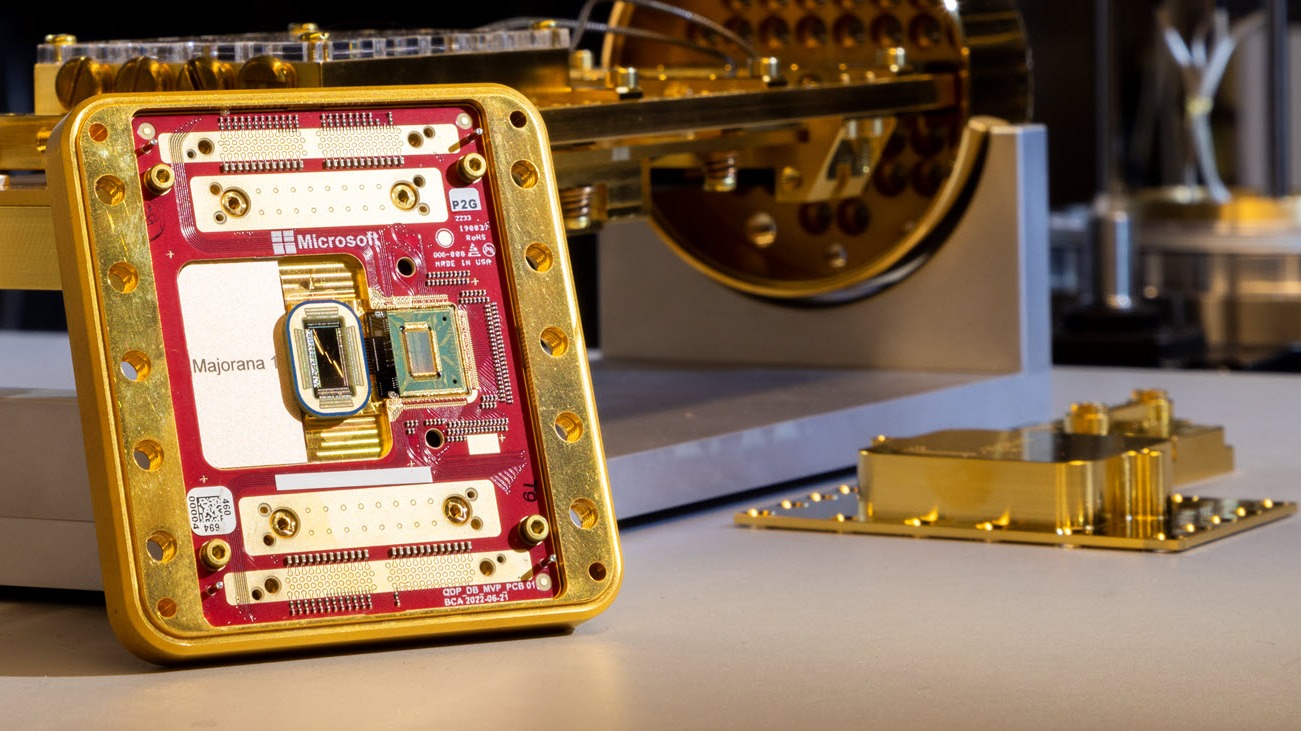Microsoft has revealed a new quantum chip called Majorana 1 that it claims could bring practical quantum computing within years rather than decades, challenging conventional timelines in the industry.
The tech giant says its new chip is powered by the world's first "topoconductor" - a revolutionary material that can create an entirely new state of matter, distinct from solids, liquids or gases, called a topological state.
"Many people have said that quantum computing, that is to say useful quantum computers, are decades away," said Chetan Nayak, Microsoft technical fellow of quantum hardware. "I think that this brings us into years rather than decades."
The announcement follows Nvidia chief executive officer Jensen Huang's recent claim that practical quantum computing was still 20 years away, reflecting broader scepticism in the industry.
Microsoft believes its approach offers significant advantages over rival quantum technologies. The Majorana 1 chip relies on exotic particles called Majorana fermions, which were first theorised in 1937 but had never previously been observed or controlled.
"The hardest part has been solving the physics. There is no textbook for this, and we had to invent it," said Jason Zander, Microsoft executive vice president who oversees long-term strategic bets. "We literally have invented the ability to go create this thing, atom by atom, layer by layer."
The current chip contains eight "topological qubits" - the quantum equivalent of traditional computing bits. Microsoft claims these qubits are less prone to errors than competing approaches, potentially requiring far fewer error-correction qubits.
While rivals like Google and IBM have developed chips with more qubits, Microsoft believes its technology will be easier to scale up, potentially fitting up to one million qubits on a single palm-sized chip.
The US Defense Advanced Research Projects Agency (DARPA) appears to share Microsoft's optimism, recently selecting the company's topoconductor as one of just two approaches it's exploring in a programme intended to build industrially useful quantum computers by 2033.
However, experts caution that more data is needed before the significance of Microsoft's breakthrough can be fully assessed.
"The new papers are a significant step, but as with much promising work in quantum computing, the next steps are difficult and until the next steps have been achieved, it is too soon to be anything more than cautiously optimistic," said Paul Stevenson, professor of physics at the University of Surrey.
Quantum computing promises to solve complex problems that classical computers cannot tackle - from breaking down microplastics to developing self-healing materials and solving complex supply chain challenges.
Microsoft's approach represents a high-risk, high-reward strategy. Its previous claims about topological qubits had to be retracted after scientific flaws were identified, and the company has spent nearly two decades pursuing this challenging path while competitors made steady progress with alternative approaches.
"From the start we wanted to make a quantum computer for commercial impact, not just thought leadership," said Matthias Troyer, Microsoft technical fellow. "We knew we needed a new qubit. We knew we had to scale."
Latest News
-
BAE Systems launches UK tech incubator scheme
-
Morrisons to launch real-time engagement tech across stores
-
Crypto exchange Gemini to cut workers, exit UK, EU and Australia amid market slump
-
Anthropic unveils Claude Opus 4.6 as enterprise AI race intensifies
-
Government to collaborate with Microsoft on deepfake detection framework
-
50% of firms will rehire staff laid off due to AI by 2027, predicts Gartner
The future-ready CFO: Driving strategic growth and innovation
This National Technology News webinar sponsored by Sage will explore how CFOs can leverage their unique blend of financial acumen, technological savvy, and strategic mindset to foster cross-functional collaboration and shape overall company direction. Attendees will gain insights into breaking down operational silos, aligning goals across departments like IT, operations, HR, and marketing, and utilising technology to enable real-time data sharing and visibility.
The corporate roadmap to payment excellence: Keeping pace with emerging trends to maximise growth opportunities
In today's rapidly evolving finance and accounting landscape, one of the biggest challenges organisations face is attracting and retaining top talent. As automation and AI revolutionise the profession, finance teams require new skillsets centred on analysis, collaboration, and strategic thinking to drive sustainable competitive advantage.
© 2019 Perspective Publishing Privacy & Cookies










Recent Stories